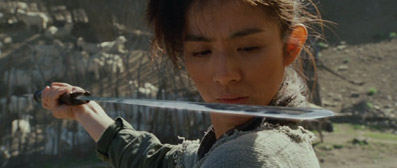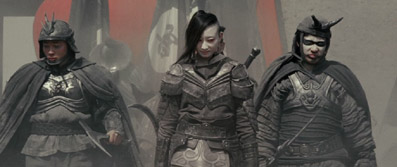|
Popular number, seven. Aside from its lucky associations and game-winning dice roll, it has repeatedly made its way into cinema titles, providing brides for brothers, deadly sins to inspire a series of violent crimes, and samurai to defend besieged villagers. That last one in particular has left its mark, with Kurosawa Akira's magnificent Seven Samurai inspiring any number of later cinematic adventures, including a few remakes that have retained the plot and characters but shifted the location, to the wild west in The Magnificent Seven (1960), outer space in Battle Beyond the Stars (1980) or the Kyrgyzstan wilderness in The Wild East [Dikiy vostok] (1993).
The latest to join this little list is Tsui Hark's Seven Swords [Chat gim], the tale of seven swordsmen recruited to defend a village from a murderous general and his troops in 17th Century Manchurian controlled China. Although based on the novel Seven Swordsmen from Mountain Tian by Liang Yusheng, the borrowings from Kurosawa can been keenly felt, from the plot structure to character traits, while the historical setting has been divorced from reality by way of fantasy elements from wuxia martial arts cinema, and bad guys as spectacularly evil as anything in old-school kung fu storytelling. This last element in particular is established loudly at the start, as the General, his troops, and his nasty wife slaughter an entire village in particularly graphic fashion, their unpleasant nature given visual representation through wifey's goth warrior make-up and a hairstyle borrowed from Gary Oldman in The Fifth Element.

This is post-Hero, post-House of Flying Daggers martial arts cinema, and how you react to Hark's approach here will be governed in part by your like or dislike of these films and their ilk. On the up side, the film looks fabulous from start to finish, being gorgeously lit, designed and photographed. But this is sometimes achieved at the expense of everything else, especially the fight sequences, where the skills of the practitioners and action director are often lost in a dizzying whirl of fast cut close-ups, stylised angles, and rapid camera moves. Somewhat paradoxically, the most clearly presented battle takes place in the most restricted location, a climactic sword fight staged in a narrow corridor, where the wall-climbing choreography should have every genre fan squealing with delight.
Seven Swords shares with House of Flying Daggers a strong sense of the mythical and a head-first immersion in the tragic, as well as a surprising touch of Arthurian legend in the shape of a localised Excalibur stand-in (or seven). Character development is somewhat restricted, with each of the seven warriors defined by and named after their weapons ('Celestial Beam Sword', 'Transience Sword', 'Unlearned Sword') and deadly serious about, well, everything. Here, the film would have benefited no end from even a hint of Seven Samurai's character development – the swordsmen are recruited in a matter of seconds and launch into action just minutes later with the skill of Marvel superheroes, laying waste to a platoon that has just arrived at the village to give the nice people there a bit of a seeing-to. The drama that sits between the action doesn't help much, being just a little too po-faced, with characters falling suddenly into tastefully staged lust, wrestling with unkind memories, and standing on a hilltop and looking lovingly towards the mountains of home, as the occasionally overwrought score wells up to unsubtly prod an emotional response from the cynical.
I should reiterate that this is very much a personal view that many will and do disagree with, and the film has already built up a quite passionate fan base. The widespread popularity of Zhimou's double suggests that Seven Swords will find favour with western audiences, albeit on a considerably smaller scale. It has been frequently argued, with good reason, that Eastern horror and action cinema is currently getting right precisely what Hollywood is doing wrong. But telling familiar tales in a way that emphasises the look over the content and with one eye on current cinematic trends is precisely what Hollywood has been repeatedly guilty of, and is the very thing that, for me at least, makes Seven Swords a film that provokes interest rather than excitement.
The anamorphic 2.35:1 transfer here is a treat, with colour rendition, detail and contrast levels all superb. Bright snowscapes and darkened caverns all look equally impressive, with no obvious or intrusive compression artefacts or other digital noise. As usual with Hong Kong Legends, the print is pretty much spotless.

There are Dolby and DTS 5.1 surround tracks available, both in the original Mandarin. The DTS just has the edge in terms of volume and fullness of sound, but both are splendid tracks, with dialogue, music and sound effects reproduced with crystal clarity and, where appropriate, real wallop – the canon fire later in the film sounds gorgeous, especially when compared to the Dolby 2.0 rendition on one of the deleted scenes.
Pleasingly, the English subtitles indicate at one point when characters are talking Korean, something that is important to that particular scene.
Hong Kong Legends have delivered Seven Swords as a 2-disc Platinum edition, and with no Bey Logan on hand to supply a commentary (I did wonder what he thought of the film) it's up to disc 2 to deliver the extras.
Promotional Gallery contains the UK Theatrical Trailer (1:43) – amusingly narrated by Trailer Voice Man – the UK Theatrical Teaser (1:01), the UK Theatrical TV Spot (0:31), and two Hong Kong Theatrical Trailers (1:32 and 2:53). The UK trailers are all anamorphic, the Hong Kong trailers are not. Pity – the Hong Kong trailers, especially the first one, are far more intriguing than their UK counterparts. Also here we have International Press Footage (3:29), a compilation of DV footage of Hark and his cast at a charity premiere of the film.
Interview Gallery contains a very comprehensive set of interviews with director Tsui Hark (9:09) and stars Donnie Yen (6:13), Lau Kar-Leung (8:31), Leon Lai (10:01), Duncan Chow (4:54), Charlie Young (11:00), Tai Liwu (4:27), Lu Yi (7:00), Kim So Yeun (5:59), Zhang Jingchu (10:12) and Sun Hong-Lei (15:53). All discuss working on the film, and the actors talk about their specific roles, including their reactions to getting them, while Hark fills in some details about the location and the filming. All are shot 4:3 with rather tinny, low quality sound, in Chinese with English subtitles (removable in the case of the actors, fixed for Hark).
In Forging the Sword you'll find The Making of Seven Swords (17:33), a lively behind-the-scenes featurette built around interview snippets from the collection detailed above. There are four Shooting Diaries covering Preproduction (5:13), the shoot from 31 August-20 September 2004 (4:17), September – October (5:16) and November 2004 (5:15), that provide an engaging and briskly paced look behind the scenes of the shoot and cover a lot of ground, including rehearsals, production artwork, set construction and stunt work. Hark's to-camera diaries and the odd on-set interview provide an intermittent commentary. Production Gallery (3:46) is a rolling slide show of production sketches and on-set photos.
Original Version Deleted Scenes has four entries: The Seventh Sword (1:03), A Defiant Village (2:04), Refusal to Sing (2:18) and Love Triangle (2:08). All are non-anamorphic with the subtitles in the border area, so don't zoom the picture in on your TV. A little info on why the scenes were deleted would have been nice here.
There are six entries in UK Version Deleted Scenes – Heaven's Fall Sees Too Much (1:48), Searching the Desert (4:37), Conflict Underground (2:59), A Darker Plot (1:25), A Longer Struggle (1:49) and the Original Ending (1:01). It has to be said that some of these sequences are substantial enough to affect your reading of the scenes that surround them, and so it would have been useful to have some information on just why they were removed, but none is offered up here. All of the sequences here are anamorphic.
Very much a matter of personal taste, Seven Swords did little for me, but then I was never a huge fan of Yimou's beloved double, which dazzled the eye but too often played to me like technical and artistic exercises with little heart. Those who thrilled at Hero and The House of Flying Daggers may be more receptive to Hark's approach here, but Seven Swords, handsomely shot though it is, lacks that visual 'wow' factor that made almost every shot of Yimou's films genuine head-turners. But the film has already found a fairly devoted audience and the story on which it is based is apparently being developed as a TV series, a multiplayer online game, and a series of comic books, giving some idea of its popularity on home turf. It's definitely one for all fans of martial arts cinema to check out, and if you are receptive to its pleasures then you can't go wrong with this DVD, which boasts a superb transfer and a fair number of interesting extras.
|